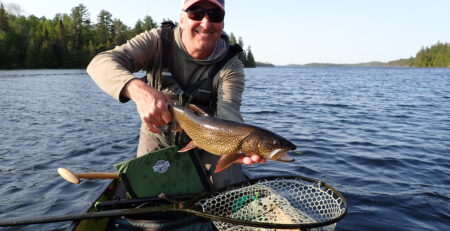Save Trout in the Classroom – call your Senator!
The Trout in the Classroom program – now in 60 schools around MN – will be forced to end on June 30 unless the Legislature passes an appropriations bill that respects the work of the Legislative-Citizen Commission on Minnesota Resources (LCCMR). A phone call from you to your state senator this week is necessary to ensure we can educate the next generation of conservationists, voters, and anglers about protecting watersheds and trout.
The LCCMR is the commission that makes recommendations for how to spend dedicated funding from the Environment and Natural Resources Trust Fund (ENRTF). Below is a link to an article on the ENRTF that was published in the Star Tribune on April 28. It describes how a senator stripped out 25 environmental projects that the Commission recommended be funded to make room for 19 unvetted projects that are traditionally paid for with General Funds, not dedicated funding. MNTU’s outdoor education program was one of those 25 worthy projects removed.
We need you to place a short call to your Senator and Senate Majority Leader Miller asking the Senate to pass a LCCMR appropriation bill that does not include projects never vetted by the LCCMR. Please call, rather than emailing, since calls have a greater impact and emails often do not reach senators in a timely fashion.
Who to call:
1. Your State Senator: Just enter your address in the box on this MN Legislative search tool:
https://www.gis.lcc.mn.gov/iMaps/districts/ Click the “Contact” button next to your senator’s name. His/her phone number will appear below their senate address. Dial the number.
2. Senate Majority Leader Jeremy Miller: 651-296-5649
What to say:
“Please pass a LCCMR appropriations bill that does not include projects never vetted by the LCCMR, and one that the Governor will sign. Restore funding to the 25 worthy projects considered by the Commission that were removed to shift dollars to unvetted projects.”
Please be respectful! Introduce yourself as a constituent of your senator. Leave a voice message if you get a recording.
Further context.
The 17-member LCCMR needs a super majority of 12 members to approve a formal recommendation to the Legislature. This year the LCCMR ended up with two competing versions that both fell shy of the 12 votes needed. However, both versions had sufficient funding to operate the Trout in the Classroom program for two years. One version ended up as House bill HF 3765, the other version as Senate bill SF 4043. Last week Senator Westrom garnered enough votes in committee to strip out 25 projects, to make way for agency program funding traditionally paid for with general funds.
The House and Senate must each pass a LCCMR appropriation bill and any differences would then be resolved through negotiations in a “conference committee”. The House passed its good version (HF 3765) in April. The bad Senate version of the LCCMR appropriations bill (SF 4043) must be passed by the full Senate this week and a conference committee appointed. It is likely that conference committee negotiations will begin in a day or two.
The concern is that, due to all the bad changes to the LCCMR recommendations by the Senate, finding a suitable compromise will be so challenging that an LCCMR appropriations bill will not get passed this session at all. If this happens, MNTU’s outdoor education program featuring “Trout in the Classroom” and hands-on streamside learning will end. Our great educators will move on to other employers. Our summer fishing skills clinics, which are organized by our TIC staff, will cease after August 2022. Efforts to secure large private grants and donations to keep the program going have not been successful. In short, the Legislature must pass a bill this year (not next) or our successful program will end.
A conference committee should start meeting in a day or two. Calls between now and Friday May 13 are essential to apply pressure on the Senate and Legislature. The Legislature adjourns May 23, but any agreements will be figured out closer to May 20.
Thank you for taking a few minutes to foster the next generation of conservationists!
Star Tribune article from April 28:





